Dmitri Ragano's Blog, page 2
February 5, 2013
The Fugitive Grandma
This month, my novel The Fugitive Grandma is out in print. It's a bit different from my Temo McCarthy novels... it combines the thriller, black comedy and family drama genres. It's about a boy and his grandma who go on a crime spree, robbing a chain of big box retail stores for cash and prescription drugs.
The Fugitive Grandma is the first novel I ever wrote and for some friends and family it's still their favorite.
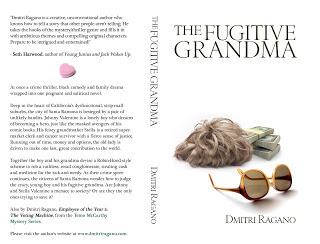
In 2005, at the age of 34, I decided to start my first novel. I wrote short stories and made films during my teenage years. Then during college at San Francisco State I wrote a screenplay which was produced as a feature film called The Lost Cause, which made it as far as a minor Bay Area film festival. The experience writing The Lost Cause left me disappointed, discourage and a little bored with the creative process... and for the next dozen years I focused my energies in other pursuits: working as a journalism, learning foreign languages, traveling the world, jumping into the Internet entrepreneurial boom. Most importantly, I met and fell in love with my wife. Sharing a life with her has been the most wonderful thing that ever happened to me.
The Fugitive Grandma started as an hobby... something to do in airport lobbies during business travel for my day job. The book took about 3 years to complete. Then another year was spent sending out query letters to agents and publishers. I never did find anyone who was willing to go further than the query letter and actually take a look at the manuscript.
In the meantime, with the e-book boom of the past couple years, I've published two more novels. But friends and family have never stopped urging me to get The Fugitive Grandma into print. So here it is.
Published on February 05, 2013 06:06
February 3, 2013
Rich and Poor
Favela is the Brazilian word for slum or shanty town. Last month, I visited Rocinha, the largest favela in the Rio de Janiero through a visit arranged by Marcelo Armstrong’s Favela Tours, which donates proceeds to local schools and charities.
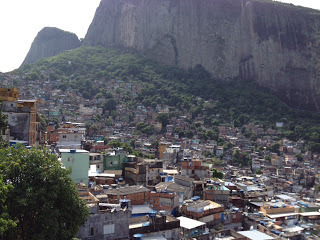 Rocinha
RocinhaAbout 20 percent of Rio’s poorest citizens live in favelas like Rocinha.
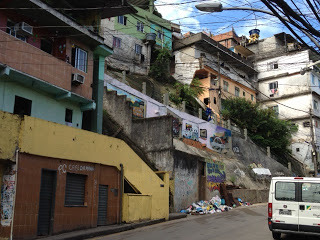
These places have been historically neglected by the government and official institutions. Residents usually do not have title to the land where they live. And they often lack access to basic services like health care, education, jobs, sanitation and police protection.
Drug gangs are the de facto authority in many favelas, gangs with names like the Red Command, the Third Command and the Friends of the Friends. These gangs grew with the rise of cocaine production in Latin America during the 1970s and 80s. They learned many of their fighting tactics in prison from left-wing guerrillas who fought against Brazil’s military dictatorship during that period.
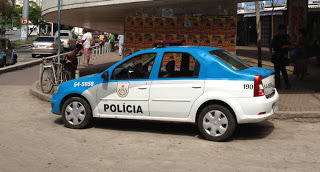
The gangs have a strong incentive to keep favelas safe for the local residents so that police don’t come in and interfere with their narcotics trade. According to Armstrong’s guides, many favela residents feel safer in gang-controlled areas and trust the gangs more than the police or the local government. Rocinha was the scene of a police and military operation in 2011 to take control away from organized criminal gangs. In the past two years, the police are making a concerted effort at community outreach, trust building and a constant local presence in Rocinha.
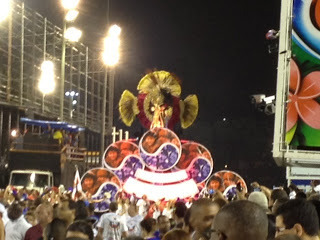 Many of the famous samba schools from Rio's Carnivale are based in favelas
Many of the famous samba schools from Rio's Carnivale are based in favelas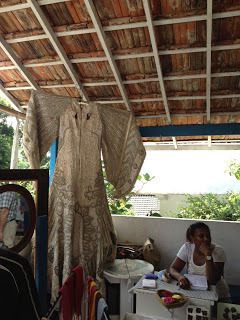
Many residents feel a strong sense of pride and community in their favela and choose to stay there even when they have the economic means to leave. Favelas are also a major source of lively dance, music, culture and the arts that make Rio legendary . Many of the famous samba schools that participate in Rio’s world famous carnivale are based in the favelas.
The word favelacomes from a bloody period in Brazilian history following the end of slavery in that country during the late 19th century. During that time, a charismatic, mystical preacher named Antônio Vicente Mendes Macie wandered through poor and disenfranchised areas in northeastern Brazil. He gathered a following of racially-diverse, destitute believers who settled within him in a town called Canudos.The government brought in outside soldiers to destroy Canudos. For slaughtering the upstarts, the soldiers were promised land in Rio de Janiero where they could build homes and live.After killing the preacher and thousands of followers in the Canudos war, the government broke its promise to the soldiers and did not give them title to land in Rio. They decided to settle in the land anyway, naming the area after the favela plant in Bahia where they slept during the war against the preacher’s followers in Canudos.
The favelas are still scenes of struggle and violence, but according to Armstrong, conditions have gotten much better in Rocinha during the past decade in Brazil. The government has invested in basic services like garbage collection. Children attend school. NGOs and federal authorities are trying to eradicate tuberculosis and other diseases that persist in some neighborhoods.Like many favelas, Rocinha sits next to one of the wealthiest neighborhoods in Brazil. Luxury mansions with palm-lined gardens and security cameras sit across the street from shanty towns where people like in concrete mazes next to open sewage canals.We visited a community school called Para Ti, which was founded for favela children by a late Italian auto executive who ran the Fiat’s Brazil operations and lived in an exclusive estate less than a block away from a favela.
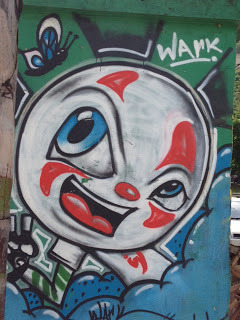
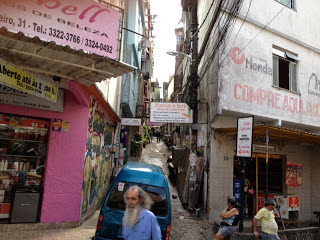
The challenge of the favelas is not uniquely Brazilian. You could find similar juxtaposition of rich and poor neighborhoods in Los Angeles or so many parts of the world. Inequality and poverty are age old problems and may never go away. The super-rich in any society have the ability have the means to acquire and consume more material objects... more houses, cars, boats and jewelry. But with climate change and resource depletion, we as a species will have to curb our addiction to material consumption in the future.
The challenge is how we create basic standards of universal rights – to health, safety, education, the right to work under decent conditions – so that is doesn’t matter whether you are rich or poor and you can have decent life either way.
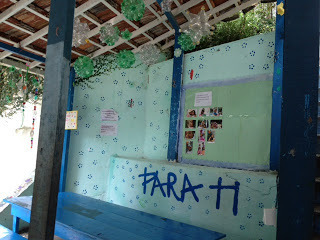 Para Ti Community School
Para Ti Community School 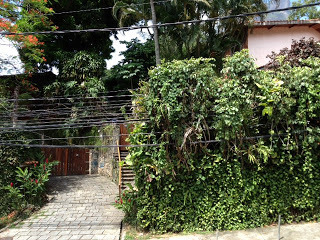 Wealthy estates sit behind barbed wire across the street from a favela
Wealthy estates sit behind barbed wire across the street from a favela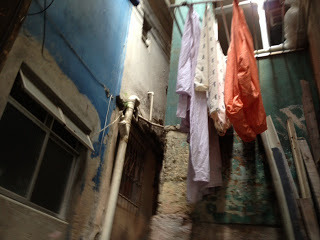
Economist Adam Smith is often cited as the god of free market capitalism, mostly by people who have not actually read his work. The Wealth of Nations is nuanced and subversive and morally critical of the injustice and inequality that can come out of an uncontrolled market system.
One of my favorite Smith quotes from The Wealth of Nations: “All for ourselves and nothing for other people, seems, in every age of the world, to have been the vile maxim of the masters of mankind.”
In many ways this as true now as it was when he wrote it in 1776. But positive steps forward in places like Rocinha show that it doesn’t have to be that way forever. Another world is possible.
Published on February 03, 2013 08:40
January 6, 2013
Sao Paolo
Typically this blog focuses on my fiction and journalism. But I travel to different parts of the world quite a bit. I've lived in the US and Japan and visited over 25 countries in Europe, Asia and Latin America. So it's important to talk about the places I travel to, because they have a powerful influence on how I think and live my life.
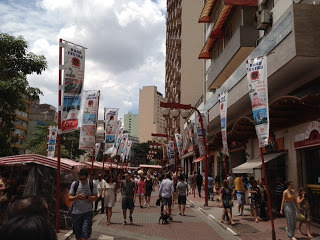
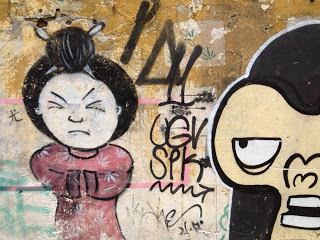
Right now I am in Brazil.
Bom Dia from Sao Paolo, the business center of Brazil and the largest city in South America. It's hard not to fall in love with the energy and diversity of this megalopolis, and endless sprawl of twenty-stories buildings, tropical trees and multi-racial faces as far as the eye can see in any direction.
In many ways, Sao Paolo looks like the future because it feels so multi-cultural and expansive. It is one of the most ethnically diverse cities in the world, including the largest groups of Japanese, Italian and Lebanese immigrants in the world in neighborhoods such as Libertedad, Bixiga and Bom Retiro.
These pictures above show the Libertade neighborhood, where Japanese immigrants first came to fuel the coffee boom the sparked economic growth during the late 19th century. The pictures below show the Bixiga neighborhood where Italians came in the second major wave of the coffee boom.
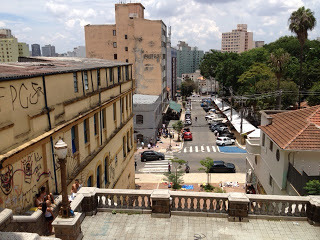
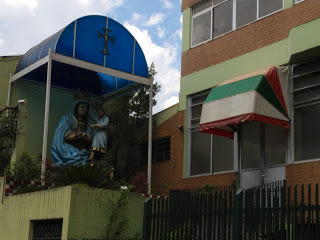
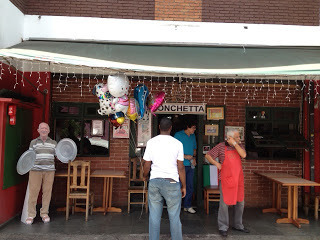 Sao Paolo is also a vibrant illustration of the economic inequality that proliferates cities around the world. The "jardines" full of super-wealthy who can helicopter across the city are only a few miles away from the "favellas" full of starving families and desperate crackheads. The pictures below show the cathedral and civic plazas in the Centro district, where government services and free health care constantly battle an endless tide of poverty, despair and addiction.
Sao Paolo is also a vibrant illustration of the economic inequality that proliferates cities around the world. The "jardines" full of super-wealthy who can helicopter across the city are only a few miles away from the "favellas" full of starving families and desperate crackheads. The pictures below show the cathedral and civic plazas in the Centro district, where government services and free health care constantly battle an endless tide of poverty, despair and addiction.
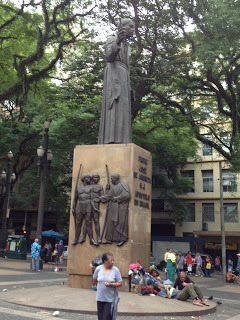
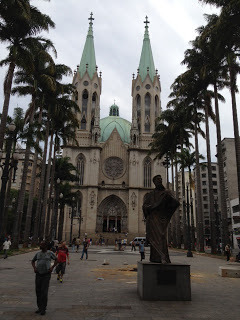
Sao Paolo feels like an answer to some sort of metaphysical hypothesis: if you bring representatives of the human species from the far corners of the earth, with so many different racial, religious and economic circumstances, can they work things out? After a couple days in the city, the answer feels like yes, though I hardly profess to be an expert and verdict is hardly settled.


Right now I am in Brazil.
Bom Dia from Sao Paolo, the business center of Brazil and the largest city in South America. It's hard not to fall in love with the energy and diversity of this megalopolis, and endless sprawl of twenty-stories buildings, tropical trees and multi-racial faces as far as the eye can see in any direction.
In many ways, Sao Paolo looks like the future because it feels so multi-cultural and expansive. It is one of the most ethnically diverse cities in the world, including the largest groups of Japanese, Italian and Lebanese immigrants in the world in neighborhoods such as Libertedad, Bixiga and Bom Retiro.
These pictures above show the Libertade neighborhood, where Japanese immigrants first came to fuel the coffee boom the sparked economic growth during the late 19th century. The pictures below show the Bixiga neighborhood where Italians came in the second major wave of the coffee boom.


 Sao Paolo is also a vibrant illustration of the economic inequality that proliferates cities around the world. The "jardines" full of super-wealthy who can helicopter across the city are only a few miles away from the "favellas" full of starving families and desperate crackheads. The pictures below show the cathedral and civic plazas in the Centro district, where government services and free health care constantly battle an endless tide of poverty, despair and addiction.
Sao Paolo is also a vibrant illustration of the economic inequality that proliferates cities around the world. The "jardines" full of super-wealthy who can helicopter across the city are only a few miles away from the "favellas" full of starving families and desperate crackheads. The pictures below show the cathedral and civic plazas in the Centro district, where government services and free health care constantly battle an endless tide of poverty, despair and addiction.

Sao Paolo feels like an answer to some sort of metaphysical hypothesis: if you bring representatives of the human species from the far corners of the earth, with so many different racial, religious and economic circumstances, can they work things out? After a couple days in the city, the answer feels like yes, though I hardly profess to be an expert and verdict is hardly settled.
Published on January 06, 2013 13:55
December 30, 2012
Is War What Makes Us Human?
I was thinking about this ever since reading Walter Isaacson’s biography of Albert Einstein during October. Riding through the Nevada desert in late October on my way back from Las Vegas, I listened to the chapter chronicling Einstein’s activities in support of pacifism during the 1920s and early 1930s. (Einstein’s views about the need for war changed after Nazi’s rise to power. Like any good scientist, his views changed when the facts changed.)Albert Einstein wrote a letter to Sigmund Freud asking a seemingly unanswerable question: could humanity everforsake its tendency to engage in war, violence and destruction?
I greatly admire your passion to ascertain the truth--a passion that has come to dominateall else in your thinking. You have shown with irresistible lucidity how inseparably theaggressive and destructive instincts are bound up in the human psyche with those of loveand the lust for life. At the same time, your convincing arguments make manifest yourdeep devotion to the great goal of the internal and external liberation of man from theevils of war. This was the profound hope of all those who have been revered as moral andspiritual leaders beyond the limits of their own time and country, from Jesus to Goetheand Kant.
Freud, like Einstein, was an ardent supporter of the international anti-war movement following the First World War. Still, the legendary psychologist was skeptical that mankind as a species could ever be extricated from his warlike tendencies. Humans are animals, Freud reasoned, and within the animal kingdom competition for resources and rewards are typically settled through conflict and subjugation by force.
Conflicts of interest between man and man are resolved, in principle, by the recourse to violence. It is the same in the animal kingdom, from which man cannot claim exclusion...The upshot of these observations, as bearing on the subject in hand, is that there is no likelihood of our being able to suppress humanity's aggressive tendencies.
The best hope, Freud suggested, might be to create a world that “brings out the significant resemblances between men calls into play this feeling of community, identification, whereon is founded, in large measure, the whole edifice of human society.”Mankind’s combined talents in the areas of conflict and community led our species to dominate the planet. Territorial aggression was an important earlier evolutionary trait in homo sapiens, as it enabled humans to acquire and pertain land and resources for an expanding population. The trait that complements this aggression that other species lacked was our ability to “socialize” or bond around ideas and efforts on behalf of a larger community, pursuing objectives beyond our own selfish needs and gratification.In his book The Social Conquest ofEarth, the biologist Edmund O. Wilson, talks about these twin forces in our DNA, referring to them as the “selfish” alleles and the “altruistic” alleles. He suggests, in language somewhat reminiscent of Freud’s letter to Einstein, that to extract these selfish alleles from our essence would make us something less than human. Maybe closer, Wilson writes, to ants, who are the only other species that exhibit advance social behavior comparable to humans. Ants in contrast to humans, however, systematically act in ways that seem self-sacrificing based on their role in the ant colony, as if they were pre-programmed with only “altruistic” alleles that ignore their selfish needs of them or their offspring but serve a larger purpose for the species.Can we renounce violence, selfishness and aggression but still remain human? The question is as puzzling today as it was to Einstein nearly a century ago. I think and hope that humanity can evolve in time, balancing the selfish alleles and the altruistic alleles in a way that assures not only our survival but a more peaceful and prosperous future. One of the things that motivates the writer is the quest to ascertain the true nature of humanity. Journals, essays and works of fiction are created in the Quixotic pursuit of seemingly unanswerable questions about what it is that makes us human.
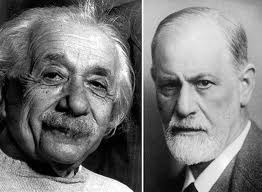 The writer toils away like a soldier ant in a vast colony. He is unsure if his exact location or purpose, he is only dimly away of his role in some larger, incomprehensible system. Still, he is powered by some instinctive drive to find meaning, as if participating in a vast, bottomless, evolutionary stew of ponderings and conversations might somehow lead one step closer to resolution of unsolvable problems. Writing, when exercised with a clear mind and heart, has the power to create this feeling of identification and community among people, this feeling that Freud and Einstein hoped could ultimately save us from ourselves.
The writer toils away like a soldier ant in a vast colony. He is unsure if his exact location or purpose, he is only dimly away of his role in some larger, incomprehensible system. Still, he is powered by some instinctive drive to find meaning, as if participating in a vast, bottomless, evolutionary stew of ponderings and conversations might somehow lead one step closer to resolution of unsolvable problems. Writing, when exercised with a clear mind and heart, has the power to create this feeling of identification and community among people, this feeling that Freud and Einstein hoped could ultimately save us from ourselves.
Published on December 30, 2012 12:56
December 20, 2012
My First Novel in the Orange County Public Library System
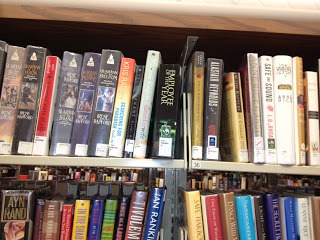 It's hard to think of an institution that has played a longer and more influential role in my life than the local library. It's probably the only place I visit as frequently now as I did when I was four years old.
It's hard to think of an institution that has played a longer and more influential role in my life than the local library. It's probably the only place I visit as frequently now as I did when I was four years old.As a young child in Pittsburgh, I was a regular at the libraries in Squirrel Hill and Wilkinsburg. (The recent movie fanfare around "The Hobbit" reminded me of a Squirrel Hill library book illustration content I won when I was seven years old: I drew a picture of Bilbo riding the barrel down the river.) During my time in San Francisco, the libraries were a disappointment (though they may have improved since I left in 2001.)
But since moving to Orange County in 2003 I've become a serious addict to libraries once again. There's no way I could afford to buy all the books I read (I borrow literally hundreds of titles a year from my local Irvine Heritage Park branch. Orange County has a wonderful Internet system that allows you to reserve a book from any branch in the entire country and pick it up at your local neighborhood branch.)
I am pretty proud that Employee of the Year has sold over 250 copies during the past year, considering it was self-published as a side hobby and received no publicity and marketing to speak of. But I am prouder still that people here in Orange County and now borrow it and read it for free. And although Employee of the Year Kindle version is priced the same as a cup of coffee, there's no denying that many people will always prefer a paperback.
So this is an exciting milestone for me.
Published on December 20, 2012 11:34
December 16, 2012
Writeliving Interview
My interview with poet and novelist Martin Ott on his literary blog.
Writeliving Interview – Dmitri Ragano
The Writeliving interview series kicks off its first foray into genre fiction with journalist and internet professional turned mystery author Dmitri Ragano. I had the pleasure a few years ago to read part of a manuscript by Dmitri from a mystery called The Fugitive Grandma, and I’ve been a fan ever since. His first novel Employee of the Year, is a mystery must-read, and he is now releasing his second novel The Voting Machine.
- Martin Ott
Tell us about the new novel.
It’s a thriller set during an election in Las Vegas. Two political activists are killed as they cast their votes in a critical swing state Senate race. The murder victims are rival campaigners on opposite sides of the liberal – conservative divide. One is a retired school teacher, an ex-hippie who remains active in progressive causes. The other is a rich Tea Party supporter whose son served in Iraq.
Temo McCarthy, the hero of the story, is a volunteer in a voter registration drive and he knows both of the murdered men. The FBI asks Temo to assist their investigation based on his experience canvassing Las Vegas during the election campaign. The killings are then linked to broader threats of a terrorist attack on the general election. Temo has experience with main suspects in the attack: a mysterious Middle Eastern charity, a Mexican drug cartel and anti-government, white-supremacist militia.
What inspired you to write this story?
I love elections. I love politics. Social studies was always my favorite subject in grade school. I worked as a voter registration volunteer in Las Vegas in 2008 and it was an amazing experience. You put yourself out there in front of strangers and try to persuade them to take an action because you believe in the ideas behind democracy. Some people admire what you’re doing and some people hate you for it. One day you’re going door to door in a neighborhood full of rich retirees with Jaguars and BMWs in the driveway. The next day you are block walking with your clipboard in a rough part of town, talking to homeless and ex-felons who can’t vote until they get off probation.
It’s a big, sprawling country and it’s easy for us to become disconnected from the majority of our fellow citizens. We are rarely drawn into civic collaboration or public discussion beyond our own social/professional network. But elections are one of the ways we engage around ideas and common themes in public life. It’s a messy, bitter process but it is fascinating. It shows you all the different things that either motivate people or make them apathetic. It shows you how individuals construct their relationship to other people and society as a whole.
I want to emphasize that while I may have my own personal politics, this book isn’t a polemic. It merely aims to tell a good story that is rooted in real experiences. It’s about the human needs and the contradictory emotions that fuel our participation in politics.
This is your second novel featuring Temo McCarthy. He was also the protagonist the first book, Employee of the Year. Tell us the background behind this character.
The idea for this character was to create a kind of everyman in a modern urban setting. I wanted a hero who was flawed, humble and recognizable… He shouldn’t have exceptional skills or talents like say a Sherlock Holmes or James Bond. Temo isn’t particularly smart or tough and he has no elite training or background. His awareness of his limitations becomes an advantage. He’s spent most of his life as a loser and he goes into most situations expecting things to work against him. And yet he never gives up, just like his historical namesake Cuauhtemoc, who kept on fighting as his whole civilization collapsed in a way that must have been unimaginably horrific. Temo never loses his will to survive and maintain some kind of integrity.
Why did you choose to self-publish your novels?
I’ve been working around the Internet space since 1995, first as a HTML programmer, then in start-ups and more recently as a product manager. I think if you come from that background it’s always your first instinct to try and do something yourself – get it our there in front of an audience and get feedback. That iterative, interactive process is how you are used to working. I wanted to be able to have a book I could share with readers in a relatively short cycle and I knew the process of finding a traditional agent and traditional publisher can take years. At the same time, there’s this massive sea change going on in the book industry with the push towards e-book distribution and marketing so I thought it would be useful to get first-hand experience even if I ended up partnering with a traditional publisher in the future.
Writeliving Interview – Dmitri Ragano
The Writeliving interview series kicks off its first foray into genre fiction with journalist and internet professional turned mystery author Dmitri Ragano. I had the pleasure a few years ago to read part of a manuscript by Dmitri from a mystery called The Fugitive Grandma, and I’ve been a fan ever since. His first novel Employee of the Year, is a mystery must-read, and he is now releasing his second novel The Voting Machine.
- Martin Ott
Tell us about the new novel.
It’s a thriller set during an election in Las Vegas. Two political activists are killed as they cast their votes in a critical swing state Senate race. The murder victims are rival campaigners on opposite sides of the liberal – conservative divide. One is a retired school teacher, an ex-hippie who remains active in progressive causes. The other is a rich Tea Party supporter whose son served in Iraq.
Temo McCarthy, the hero of the story, is a volunteer in a voter registration drive and he knows both of the murdered men. The FBI asks Temo to assist their investigation based on his experience canvassing Las Vegas during the election campaign. The killings are then linked to broader threats of a terrorist attack on the general election. Temo has experience with main suspects in the attack: a mysterious Middle Eastern charity, a Mexican drug cartel and anti-government, white-supremacist militia.
What inspired you to write this story?
I love elections. I love politics. Social studies was always my favorite subject in grade school. I worked as a voter registration volunteer in Las Vegas in 2008 and it was an amazing experience. You put yourself out there in front of strangers and try to persuade them to take an action because you believe in the ideas behind democracy. Some people admire what you’re doing and some people hate you for it. One day you’re going door to door in a neighborhood full of rich retirees with Jaguars and BMWs in the driveway. The next day you are block walking with your clipboard in a rough part of town, talking to homeless and ex-felons who can’t vote until they get off probation.
It’s a big, sprawling country and it’s easy for us to become disconnected from the majority of our fellow citizens. We are rarely drawn into civic collaboration or public discussion beyond our own social/professional network. But elections are one of the ways we engage around ideas and common themes in public life. It’s a messy, bitter process but it is fascinating. It shows you all the different things that either motivate people or make them apathetic. It shows you how individuals construct their relationship to other people and society as a whole.
I want to emphasize that while I may have my own personal politics, this book isn’t a polemic. It merely aims to tell a good story that is rooted in real experiences. It’s about the human needs and the contradictory emotions that fuel our participation in politics.
This is your second novel featuring Temo McCarthy. He was also the protagonist the first book, Employee of the Year. Tell us the background behind this character.
The idea for this character was to create a kind of everyman in a modern urban setting. I wanted a hero who was flawed, humble and recognizable… He shouldn’t have exceptional skills or talents like say a Sherlock Holmes or James Bond. Temo isn’t particularly smart or tough and he has no elite training or background. His awareness of his limitations becomes an advantage. He’s spent most of his life as a loser and he goes into most situations expecting things to work against him. And yet he never gives up, just like his historical namesake Cuauhtemoc, who kept on fighting as his whole civilization collapsed in a way that must have been unimaginably horrific. Temo never loses his will to survive and maintain some kind of integrity.
Why did you choose to self-publish your novels?
I’ve been working around the Internet space since 1995, first as a HTML programmer, then in start-ups and more recently as a product manager. I think if you come from that background it’s always your first instinct to try and do something yourself – get it our there in front of an audience and get feedback. That iterative, interactive process is how you are used to working. I wanted to be able to have a book I could share with readers in a relatively short cycle and I knew the process of finding a traditional agent and traditional publisher can take years. At the same time, there’s this massive sea change going on in the book industry with the push towards e-book distribution and marketing so I thought it would be useful to get first-hand experience even if I ended up partnering with a traditional publisher in the future.
Published on December 16, 2012 19:57
December 8, 2012
The Global E-Book and the Rise of the Digital Self-Publisher
From a presentation I gave at the Lavacon Content Strategy conference in Portland.
Michael Tamblin, the CEO of Kobo, made an interesting observation recently. He mentioned that self-published titles now make up 7 % of sales in the US, which is as big a share as any single major publisher.
But here's the interesting part.
In Latin America, the portion of self-published titles is 10%. In Africa, it's 14%, double the US volume. Most of these titles are local authors reaching local readers in these countries through the global e-book platform provided by Kobo as well as Amazon and Smashwords and the other emerging players.
So what the e-Book revolution is going to do is give local authors and audiences the chance to connect in parts of the world where physical book infrastructure is scarce or non-existent. This will have a momentous impact on the international reading community. Remember the impact mobile phones had in the 1990s by enabling phone communications in countries where land line phones were a rare luxury.
I self-published my ebooks because I thought it would take a long time to find a traditional publisher who believed in my work. I didn't want to wait to share my novels with family, friends and other readers.
Different authors will have different motivations... but what this ultimately means is a net gain in opportunities for writers and a net gain in options for the reading public.

Michael Tamblin, the CEO of Kobo, made an interesting observation recently. He mentioned that self-published titles now make up 7 % of sales in the US, which is as big a share as any single major publisher.
But here's the interesting part.
In Latin America, the portion of self-published titles is 10%. In Africa, it's 14%, double the US volume. Most of these titles are local authors reaching local readers in these countries through the global e-book platform provided by Kobo as well as Amazon and Smashwords and the other emerging players.
So what the e-Book revolution is going to do is give local authors and audiences the chance to connect in parts of the world where physical book infrastructure is scarce or non-existent. This will have a momentous impact on the international reading community. Remember the impact mobile phones had in the 1990s by enabling phone communications in countries where land line phones were a rare luxury.
I self-published my ebooks because I thought it would take a long time to find a traditional publisher who believed in my work. I didn't want to wait to share my novels with family, friends and other readers.
Different authors will have different motivations... but what this ultimately means is a net gain in opportunities for writers and a net gain in options for the reading public.
Published on December 08, 2012 07:18
November 25, 2012
Community Organizer
I had a pretty good idea that Obama was going to win the election the third weekend in October. That was when I was out in Nevada walking the blocks of East Las Vegas as GOTV volunteer.It was a very similar vibe to 2008, when we did block walking and registration in North Vegas and the areas around Pecos/Jones on the outskirts of the city. These earlier experiences served as the inspiration for my novel The Voting Machine.
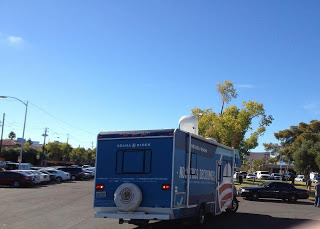
GOTV (Get Out of the Vote) is the final stage in a strategy around voter engagement that starts earlier in the election cycle with voter registration drives, creating volunteer infrastructure and neighborhood teams that lead local engagement efforts.
In October, early voting had already started in Nevada at various polling sites around Clark County. Here we were different groups of OFA affiliated volunteers going door to door, inviting everyone to participate in the election and making sure they had the knowledge (times/locations) and resources to do it.
While we focused on Democratic leaning communities more likely to support Obama, we also did outreach to historically Republican neighborhoods as well. It seems like we actually did more to go around and engage voters in these areas than the McCain or Romney (I asked some Republican voters I talked to and they said no one from their candidate’s organization had contacted them.)The most important part of our GOTV script was the commitment card. For every person we talked to who committed to vote we asked them why this election was important to them. Then the commitment card was entered into an enormous nationwide database giving the Obama campaign input from ordinary people all across the country.
No other major American political movement has done this in modern times – sending volunteers (and paid staff) out to different communities that cross boundaries of race, economics, language and religion, to talk to them, to ask them what matters.
These are very simple ideas and simple actions – politicians creating organizations by motivated volunteers who then in turn create a broad feedback loop by reaching out to ordinary people and hearing their priorities. It’s an amazing indictment of how unresponsive our political establishment is that the Obama organization’s tactics seemed so bold and revolutionary and effective in the elections of 2008 and 2012.
The big failure of Obama’s first term was the inability to continue this framework for conversation with his broader community beyond the election. It seems they’ve learned the lesson and will not repeat this mistake.
I am looking forward to seeing what comes out of it – because our country needs a infrastructure for community and civic engagement more than ever...
My blog is primarily about my work as a fiction writer (and to a lesser degree as a journalist and digital media essayist). I know it’s considered taboo to comment on politics if you are not specifically a political writer (i.e. I write fiction and also some journalism). But for me this doesn’t make sense. The issues of our day that arise in politics are too important to ignore and they are too essential to my creative and analytical life as a writer.
Published on November 25, 2012 15:26
October 2, 2012
The Voting Machine cracks top 30,000 titles on Kindle Store
Published on October 02, 2012 21:40
On the Kindle Store
Published on October 02, 2012 21:40



